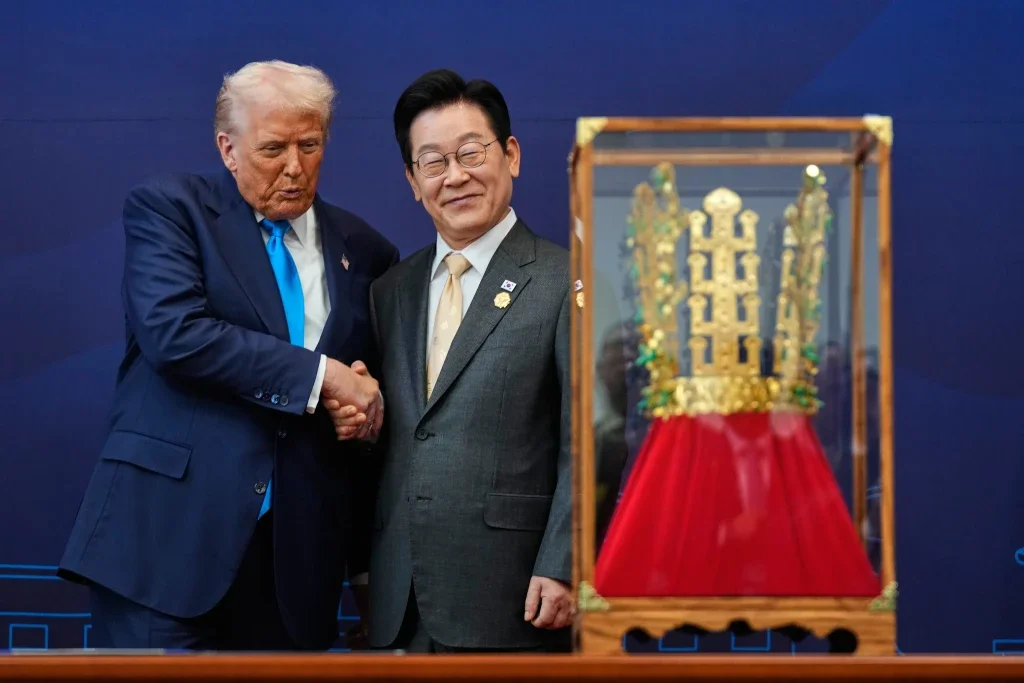East Asia

After Trump’s ‘Dry in the U.S.’ remark, South Korea’s nuclear submarine debate reignites entirely
South Korea’s options are becoming more complex as variables from the United States emerge in the discussions that were conducted on the premise of low-enriched uranium.

Japan PM Takaichi: "Defense Spending to Reach 2% of GDP Two Years Ahead of Schedule"
The new Prime Minister of Japan signals a sharp turn in security policy in the midst of rising security tensions with China and North Korea.

Soybeans at the Heart of Codependency: Food Security and Market Loss
Amid rising tensions with the U.S., China accelerates soybean imports from South America, reviving fears of long-term market loss among American farmers.

U.S.-South Korea Joint Military Exercise Prompts Threats from North Korea
Thursday, April 17: The semiannual joint “Freedom Flag” exercise between the U.S. and South Korea is set to begin today amidst tensions on the Korean Peninsula.

Bank of Japan Holds Rates at 0.5% amid Global Uncertainty
The Bank of Japan (BOJ) held its short-term interest rate at 0.5% in its March 19 meeting. The decision was widely expected, reflecting the central bank’s cautious approach as U.S. trade policies and a slowing Chinese economy weigh on Japan’s outlook.

TSMC’s Tightrope: Navigating Silicon Supremacy amid U.S.-China Rivalry
As geopolitical tension escalates, TSMC is expanding overseas while reaffirming its domestic roots. Caught between American pressure and Taiwanese interests, the chipmaker must balance global ambition with its role as Taiwan’s silicon shield.

The Implications of the China-U.S. Tariff Battle
Global markets have been shaken this past week by a tariff tit-for-tat between the U.S. and China, as both countries engage in what has been described by Chinese officials as a “fight to the end.” This tariff war is unique as President Donald Trump reversed the majority of his “reciprocal tariffs” on dozens of other countries—keeping a universal 10% on all imports to the U.S.—while elevating those against China due to a perceived “lack of respect” at the country’s decision to retaliate.

South Korea Removes its President Democratically — but Bigger Crises Loom
Yoon Suk-yeol’s ousting marks a victory for democratic checks and balances, but unresolved policy gridlock, economic uncertainty, and deepening social divides leave South Korea at a crossroads ahead of the June snap election.

North Korea Launches Missiles in Response to U.S.-South Korea Military Drills
North Korea's recent ballistic missile launches, coinciding with the U.S.-South Korea military drills, reflects its ongoing strategy of military escalation in response to perceived threats. With advancements in missile precision and solid-fuel technology, the tests pose new security challenges

China’s Parliamentary Session Begins: Main Foreign Policy Takeaways
Yesterday marked the start of China’s 14th National People’s Congress (NPC) in Beijing, a week-long meeting attended by top Chinese Communist Party (CCP) leadership including Chinese President Xi Jinping, the Politburo Standing Committee, and over 3,000 delegates from across the country. The session, also known as Two Sessions, is a means for top leadership to convey decisions about the priorities of the CCP for the next year, including economic and foreign policy decisions.

Chinese Territorial Incursions Prompt Japanese Military Buildup Near Taiwan
The Japanese military has been shoring up its defensive capabilities on the small island of Yonaguni, which is the nation’s westernmost island, and closest to Taiwan. Despite its small population, the island has become essential to the Japanese military in the past few years.

Japan and the Philippines Bolster Defense Ties Amid South China Sea Tensions
As China’s assertiveness grows in the South China Sea, Japan and the Philippines have further deepened their security partnership. Building on the 2024 Reciprocal Access Agreement (RAA), which allows Japanese forces to deploy in the Philippines for military and humanitarian operations, the two countries signed a new defense framework enhancing technology sharing. The initiative signals mounting regional concerns over China’s actions and reflects Japan’s expanding role as a key security player on the global stage.

Taiwanese Economics Ministry Officials in Washington to Discuss Semiconductor Tariff Threats
Taiwanese Economics Minister Kuo Jyh-huei states that officials from his ministry have been in Washington since Tuesday on a “routine visit” to U.S. President Donald Trump following his Jan. 27 threats of a “25, 50 or even 100 percent” tariff on semiconductors.

China’s Position on Russia-Ukraine War
Following U.S.-Russia peace talks on the Russo-Ukrainian war, Chinese officials argue that all necessary parties should be involved in discussions. Chinese involvement in negotiations evokes questions about their connections to Russia, Ukraine, and North Korea.

China Retaliates Against Trump’s New Tariffs
China has announced retaliatory tariffs following Trump's 10% tariff on all Chinese imports, targeting key U.S. industries, including energy and technology.

China’s Coal Expansion Hits a Nine-Year High, Undermining Emissions Targets
A Feb. 13, 2025, review of coal projects in China revealed that coal expansion in 2024 reached a nine-year high, raising concerns about continued fossil fuel reliance despite clean energy efforts.

Op-Ed: Will the US Stand by Taiwan? Probably Not.
Tensions between China and Taiwan have reached alarming heights as a surge in military activity from Beijing heightens the possibility of warfare. A key instigator is the 2024 election of Taiwanese President Lai Ching-te, who describes himself as a “pragmatic worker for Taiwan independence.” Lai’s election coincides with an exacerbation in Chinese aggression, including a 300 percent increase in military flights around Taiwan since May and a major October drill involving Chinese army, navy, air, and rocket forces that encircled the island. Most recently, in early November, over 35 Chinese military aircraft, including nuclear-capable H-6 bombers and drones, were detected flying to the south of Taiwan for two consecutive days.

Japan and EU Forge Strategic Defense Pact Amid Rising Tensions in Indo-Pacific
In a historic move on Nov. 1, Japan and the European Union joined together in formalizing a security and defense partnership aimed at addressing growing problems within the Indo-Pacific region. The pact signifies a deepening relationship between Tokyo and Brussels, as both raise concerns over increasing Chinese influence as well as heightened Russian military aggression.

Shigeru Ishiba: Japan’s New Prime Minister
On Oct. 1, Japan’s new Prime Minister Shigeru Ishiba was sworn into office. Ishiba is a member of the ruling LDP (Liberal Democratic Party), the same party as previous Prime Ministers Fumio Kishida and the late Shinzo Abe.

Hong Kong’s Top Court Loses Another Foreign Judge as Nicholas Phillips Resigns
British judge Nicholas Phillips has become the latest overseas justice to resign from Hong Kong’s Court of Final Appeal, stepping down on Sep. 30.
